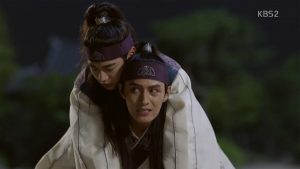 Following their review of Hwarang: The Beginning‘s relatively promising start, Leesha and Qing are back with their thoughts on the show’s strengths in its secondary characters and weaknesses in its leading lady and the main love triangle.
Following their review of Hwarang: The Beginning‘s relatively promising start, Leesha and Qing are back with their thoughts on the show’s strengths in its secondary characters and weaknesses in its leading lady and the main love triangle.
This review contains mild spoilers for Episodes 5-8. We kindly ask that readers use spoiler tags in the comments when discussing the episodes that have yet to be reviewed.
Leesha: Last week the plot was at a bit of a slow point, and, at least for me, that’s continuing. While there are some great high points and cute scenes throughout episodes 5-8, the general feeling is that things are slowing down. I’m not sure if that’s because we are building up to the more dramatic bits, or if the amount of characters and development needed for them is taking away from the action. I know, Qing, that last time you said episodes 3 and 4 dragged for you. Are you still of the same mind, or are you getting more from the plot than I am?
Qing: Episodes 5-6 continued skewing in favour of the main love triangle, which meant that other plot points were insufficiently developed. Come episodes 7-8, though, the other narrative threads started picking up. There isn’t much action yet, but the inner and external conflicts of other characters are starting to build up and move the plot forward. Empress Dowager Jiso’s past with Master Ahn-ji is unraveling, Su-yeon’s (Lee Da-in) prank gone awry will soon spark conflict between Su-ho and Ban-ryu, Master Young-shil is forwarding his political plans, and Ah-ro finally discovers that Sun-woo isn’t her brother.
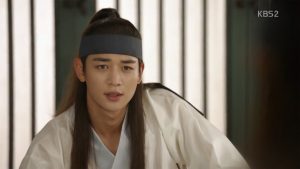 You’re right that this drama focuses more on building its characters rather than plot development, because after all, it’s a coming-of-age tale. We still don’t see much of Yeo-wool and Han-sung, but I think we’re getting there, since the focus on the other Hwarang is slowly but surely increasing. I enjoyed the glimpse beyond Su-ho’s happy-go-lucky exterior when he was coaching Sun-woo on how to (mis)treat Ah-ro. His advice is terrible and hilarious on one level, but there is some unexpected wisdom in what he says about not being too protective in order to let Su-yeon grow stronger.
You’re right that this drama focuses more on building its characters rather than plot development, because after all, it’s a coming-of-age tale. We still don’t see much of Yeo-wool and Han-sung, but I think we’re getting there, since the focus on the other Hwarang is slowly but surely increasing. I enjoyed the glimpse beyond Su-ho’s happy-go-lucky exterior when he was coaching Sun-woo on how to (mis)treat Ah-ro. His advice is terrible and hilarious on one level, but there is some unexpected wisdom in what he says about not being too protective in order to let Su-yeon grow stronger.
Leesha: Yeo-wool’s introduction was by far my favorite part of this set of episodes, and every scene with him makes me smile. The character seems so genuine so kudos to Jo Yoon-woo for his spectacular bits of acting. I’m hoping his stance on the political system and more of his story comes to light soon. We know he doesn’t know who his father is, but his mother must be a powerful, high-born woman for him not to get the same treatment as Ah-ro or even Kang-sung. Besides Han-sung, he might be the most accepting of others regardless of rank.
Qing: I have nothing but praise and admiration for Jo Yoon-woo’s performance. It’s not just that he has to act as a feminine man, but that he has to create and act out a femininity particular to Yeo-wool — the female characters in the drama don’t carry themselves the way he does. He revealed in various interviews that he referenced Eddie Redmayne‘s performance in The Danish Girl and Leslie Cheung‘s role as a male opera singer playing female roles in Farewell, My Concubine.
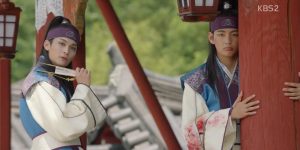 The effort he put in shows — in every gesture, expression, and turn of the phrase. Even when Yeo-wool has no particular expression, Yoon-woo keeps one side of his mouth downturned in what I’ve come to name Resting Yeo-wool Face. The result is a sensitive, compelling portrayal of a feminine male character that in no way belittles his femininity. I also have to credit the writing for this.
The effort he put in shows — in every gesture, expression, and turn of the phrase. Even when Yeo-wool has no particular expression, Yoon-woo keeps one side of his mouth downturned in what I’ve come to name Resting Yeo-wool Face. The result is a sensitive, compelling portrayal of a feminine male character that in no way belittles his femininity. I also have to credit the writing for this.
I like how Yeo-wool, riding on his half-sacred bone status, political neutrality, and his chic personality in general, is above all the petty, ridiculous infighting among the Hwarang. It’s what makes the fight scenes so funny. There’s a much darker side to the bone ranking system that we’ve already seen, but the show doesn’t always take itself seriously, which makes it fun to watch.
For me, though, the star of the last two episodes is Ban-ryu. The scene in which the boys discuss water made me realise there’s a water motif in many of the characters’ names. In hanja, Ban-ryu’s name means dispersing flows of water, which corresponds ironically to his pointed comment that water is weak because it flows around obstacles. It hints at his inner struggles.
We were introduced to Ban-ryu earlier as a cold, classist prick, but we were also privy to the loveless atmosphere he was brought up in under calculative, power-hungry fathers. This time, we see a more vulnerable, lost side to him when he witnesses Master Young-shil using his father as a step-stool to dismount the horse, and when he freezes in shock and stutters after Su-yeon’s prank.
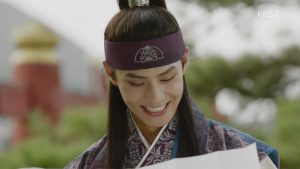 And then we see his childlike self starting to come out of its shell in how he skips through the walkway and smiles goofily at Su-yeon’s frankly written letters. This boy is actually a cinnamon roll! The other love lines I don’t care much for, but I’m rooting for this Romeo and Juliet one. It makes sense that Ban-ryu, brought up in an oppressive and scheming household, would be drawn to Su-yeon: she’s bright and optimistic, has no ulterior motives, and she isn’t prejudiced—she befriended Ah-ro despite their class differences. Reflecting on this, I was surprised by how the show managed to convey this much depth to the secondary characters through brief scenes.
And then we see his childlike self starting to come out of its shell in how he skips through the walkway and smiles goofily at Su-yeon’s frankly written letters. This boy is actually a cinnamon roll! The other love lines I don’t care much for, but I’m rooting for this Romeo and Juliet one. It makes sense that Ban-ryu, brought up in an oppressive and scheming household, would be drawn to Su-yeon: she’s bright and optimistic, has no ulterior motives, and she isn’t prejudiced—she befriended Ah-ro despite their class differences. Reflecting on this, I was surprised by how the show managed to convey this much depth to the secondary characters through brief scenes.
Leesha: Su-yeon is so funny to me, and I love how it’s her of all people to bring Ban-ryu out of his shell. For how much Ban-ryu and Su-ho fight, or end up in the same place together, it is a little weird that these are the circumstances that Su-yeon and Ban-ryu meet under. But the look on Ban-ryu’s face when he turned around and saw her was one of the highlights of the episode. His opening up is really pushing toward a true group dynamic within the core Hwarang and it seems like that’s something he’s really wanted for possibly his whole life. He was devastated upon reading the letter from his father that undoubtedly ordered him to sabotage the upcoming festival.
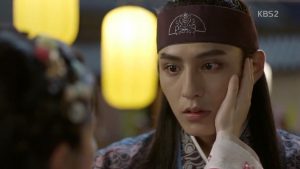 Ban-ryu seeing his birth father being used as a step-stool by his stepfather was one of the big scenes. Ban-ryu was practically compelled to go home — “Of all the places I could go,” he says, “I come here.” The conflicting feelings you see on his face are quite telling. On top of that, we see the immense difference between the sullenness that fell over him as he was near home and the lightness coming over him as he practices with and becomes closer to his fellow Hwarang.
Ban-ryu seeing his birth father being used as a step-stool by his stepfather was one of the big scenes. Ban-ryu was practically compelled to go home — “Of all the places I could go,” he says, “I come here.” The conflicting feelings you see on his face are quite telling. On top of that, we see the immense difference between the sullenness that fell over him as he was near home and the lightness coming over him as he practices with and becomes closer to his fellow Hwarang.
Though still in its early stages, the brotherhood between the Hwarang — respect, even love despite differences or expectations — is what Ban-ryu craves at home, which is why I think the next episode or two is going to be very important with Ban-ryu’s home and Hwarang life.
Qing: Do Ji-han‘s eight years of acting experience shows, especially in the parts you mentioned, where Ban-ryu struggles with his inner conflict or strains to maintain an air of indifference.
I’m pleased with most of the other performances as well. I saw Minho as Shinee‘s Minho rather than Su-ho initially, but he has since eased into his role well. V is still green and doesn’t handle transitions in dialogues well (as seen in Han-sung’s conversation with Ah-ro while she tends to his wounds). But he has managed to capture the emotional essence of his character, which isn’t something easy for a newbie.
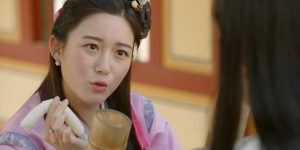 And then we come to Go Ara. She has definitely done better before, but here, we’re already eight episodes in and she is still prone to overacting, and doesn’t show sufficient nuance in many emotionally weighty scenes. There are times I feel Lee Da-in outshines her, which is a serious issue.
And then we come to Go Ara. She has definitely done better before, but here, we’re already eight episodes in and she is still prone to overacting, and doesn’t show sufficient nuance in many emotionally weighty scenes. There are times I feel Lee Da-in outshines her, which is a serious issue.
Further, the character is written and executed badly, making for an unfortunate combination. I want to like Ah-ro — she’s capable of making her own living, and has the wits to fend off Sammaekjong (now under the alias of Ji-dwi) on her own. But her agency is limited to, and even within, the love triangle, since Ji-dwi is clearly disregarding her lack of interest in him. She is stuck in a passive position in the Sun-woo identity swap too, unable to do anything except discover the truth.
What frustrates me further is the realisation that the whole story could have done without this love triangle. Sun-woo and Ji-dwi have hidden identities and socio-political struggles to deal with, they’re both trying to find their place in the world, and they both need to learn to work with the other Hwarang. There is no need for them to be straining for the affections of the same girl for their coming-of-age story to work.
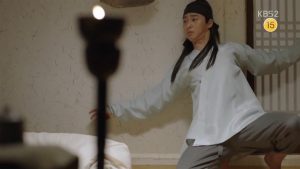 Ji-dwi could have had a platonic friendship and an excellent confidante in Ah-ro, the only character so far to have expressed a deeper understanding of his position. And Sun-woo still has plenty to learn, through the newfound family — blood-related or not — he has to protect, whereas he was responsible for no one earlier in his life. He didn’t need to have romantic feelings for Ah-ro for that to happen. And this would leave room for Ah-ro to be a more fleshed-out main character, with struggles of her own that are not all tied to romance.
Ji-dwi could have had a platonic friendship and an excellent confidante in Ah-ro, the only character so far to have expressed a deeper understanding of his position. And Sun-woo still has plenty to learn, through the newfound family — blood-related or not — he has to protect, whereas he was responsible for no one earlier in his life. He didn’t need to have romantic feelings for Ah-ro for that to happen. And this would leave room for Ah-ro to be a more fleshed-out main character, with struggles of her own that are not all tied to romance.
Did you have any issues with the plot or characters so far?
Leesha: The way Master Wi-hwa treats Sun-woo is questionable. He claims to like him, yet he uses a technicality to dismiss the most thought-out answer of the bunch. He constantly uses him as an example of how not to be and continues to threaten him with expulsion from the Hwarang despite Sun-woo being hand-picked by the Empress Dowager. His political goals aren’t clear and it’s worrisome. So many people have ideas for the Hwarang that the boys don’t even know about yet, and Master Wi-hwa isn’t any better or worse than the Empress Dowager, Master Young-shil or even Ji-dwi at this point.
The secondary characters are keeping me into it at this point. Them, and the promise of unraveling the rest of the story between the Empress Dowager and Master Ahn-ji. Even that dynamic is interesting on me. On the one hand, it’s slightly cliched, but on the other hand, I think Master Ahn-ji wants to have a change of heart. After all, if the Empress Dowager dies, then the same men that have perpetuated him living in poverty will come into power. Will he be able to rise above his resentment — after all, he’s managed to live well in many respects despite the Empress Dowager Jiso’s machinations — or will his grief cloud his judgment? Will love of family rise above love of the past?
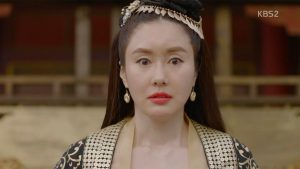 The Empress Dowager and Master Ahn-ji have a complicated, though almost typical relationship. It’s very telling that when she was feeling sick that the Empress Dowager called for Master Ahn-ji and not the imperial doctor. Despite the cold, calculating, power hungry woman we’ve seen her be so far, she’s obviously very vulnerable. Not only that, in her vulnerability she turns to the person who could do her the most damage. Master Ahn-ji could easily paralyze or kill the Empress Dowager, which we see him struggle with at one point.
The Empress Dowager and Master Ahn-ji have a complicated, though almost typical relationship. It’s very telling that when she was feeling sick that the Empress Dowager called for Master Ahn-ji and not the imperial doctor. Despite the cold, calculating, power hungry woman we’ve seen her be so far, she’s obviously very vulnerable. Not only that, in her vulnerability she turns to the person who could do her the most damage. Master Ahn-ji could easily paralyze or kill the Empress Dowager, which we see him struggle with at one point.
The scene in which Master Ahn-ji checks the tea is confusing for me. On the one hand, we already know that Master Young-shil has been slowly poisoning the Empress Dowager so this seems like too much of a coincidence, shown by the suspicious expression on Master Ahn-ji’s face when he questions the maid. On the other hand, I want to believe that he’s a better man than the woman that has taken so much from him. The Empress Dowager has done much personal wrong to him, but to purposely let her continue to imbibe the poison seems like overkill. If she dies, that wouldn’t bring his wife or real son back, nor would it bring him any higher standing. The dynamic here is tricky.
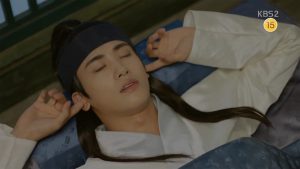 Qing: This unwinding past is humanizing Empress Dowager Jiso, who could have easily been a flat, evil court lady archetype. It’s clear from her yearning for her simple childhood with Master Ahn-ji that she wasn’t originally this way — something about marrying her uncle and then rising to power has broken her. But I don’t want her entire struggle to be based on thwarted love and jealousy; I hope we gain more insight on how she truly feels towards Ji-dwi as the plot progresses. Could it be that she is really trying to protect Ji-dwi from being twisted by the socio-political machinations that stripped away her humanity?
Qing: This unwinding past is humanizing Empress Dowager Jiso, who could have easily been a flat, evil court lady archetype. It’s clear from her yearning for her simple childhood with Master Ahn-ji that she wasn’t originally this way — something about marrying her uncle and then rising to power has broken her. But I don’t want her entire struggle to be based on thwarted love and jealousy; I hope we gain more insight on how she truly feels towards Ji-dwi as the plot progresses. Could it be that she is really trying to protect Ji-dwi from being twisted by the socio-political machinations that stripped away her humanity?
Leesha: The preview for next week introduces a new female character, and I’m hoping this mysterious princess provides a different female character type than we’ve had so far. The political intrigue is certainly getting deeper in regards to Master Young-shil’s bid for power and I’m looking forward to how things play out at the festival. Maybe this will mean the plot picking up some.
Qing: It just occurred to me that the political intrigue is building up and the love triangle is underway, but we aren’t seeing signs of the leads growing so far. I hope the show doesn’t forget its promise that this is more coming-of-age tale than romance.
Readers, what did you think of these four episodes? All you all set with handkerchiefs to wave off the Ban-ryu–Su-yeon ship as it sets sail?
(enews24, Herald Pop, Images via KBS)


